Manas Dasgupta
NEW DELHI, Jan 13: India on Monday summoned the Deputy High Commissioner of Bangladesh to India Nurul Islam to discuss the escalating tensions between New Delhi and Dhaka and reaffirmed that India was in compliance with border security protocols and agreements including fencing measures
The deputy high commissioner of Bangladesh was summoned by the foreign ministry a day after the Bangladeshi Ministry of Foreign Affairs summoned Indian High Commissioner in Dhaka Pranav Verma following allegations that India was attempting to construct fences at five specific locations along the 4,156-kilometre Indo-Bangladeshi border allegedly in violation of the agreements between the two countries.
India reaffirmed its commitment to tackling cross-border crimes like smuggling, trafficking and related activities through enhanced security measures like fencing, lighting and technical devices in a meeting with an envoy from the neighbouring country, the ministry said in a press release.
These actions were said to be in violation of a bilateral agreement governing border activities. Mr Verma had arrived at the Foreign Ministry headquarters in Dhaka around 3:00 pm local time. His meeting with Bangladeshi Foreign Secretary Jashim Uddin lasted approximately 45 minutes.
“Dhaka and New Delhi have understandings with regard to fencing the border for security. Our two border guard enforcements – BSF and BGB (Border Security Force and Border Guard Bangladesh) – have been in communication in this regard. We expect that this understanding will be implemented and there will be a cooperative approach to combating crimes along the border,” Mr Verma had said.
Diplomatic ties between India and Bangladesh have been stable historically. But, former Bangladeshi Prime Minister Sheikh Hasina’s ouster after her government was toppled in a student-led revolution in August, last year, and her subsequent refuge in India, straining relationships between the two nations.
Last month, the interim Bangladesh government led by Muhammad Yunus requested India to send back Ms Hasina to face trial but India has so far refused to act on the request. Dhaka has already issued an arrest warrant for Ms Hasina, who was supposed to appear in court in November 2024, to face charges of “massacres, killings and crimes against humanity.”
Since the collapse of her regime, several of Sheikh Hasina’s allies – accused of involvement in a police crackdown that killed hundreds of people during the unrest that led to her ouster – have been detained. India’s concern over happenings at the Indo-Bangladesh border is valid in light of past incidents at the border.
On multiple occasions, members of the Awami League and Bangladeshi citizens have reportedly been seen attempting to cross into Indian territory—a point previously highlighted by the MEA. In August last year, the body of Awami League leader Ishfaq Ali Khan Panna was discovered in Meghalaya, near the Indo-Bangladesh border. There was speculation that he may have been chased and killed by political rivals.
The ministry told the envoy that “India observed all protocols while putting fencing.” “India conveyed its expectation that all earlier understandings will be implemented by Bangladesh and that there will be a cooperative approach to combating cross-border crimes,” the statement further added.
Dhaka had previously alleged that India was trying to construct fences at five locations along the Indo-Bangla border, violating a bilateral agreement and creating “disturbances” in the region.
During his meeting with Bangladeshi officials, Mr Verma said both countries “have understandings with regard to fencing the border for security” adding that India’s efforts to ensure a crime-free border were also discussed.
The India-Bangladesh border, one of the longest international boundaries, has frequently witnessed tensions, including disputes over border security and cross-border movements. Tensions escalated last week when fencing work in the Sukdevpur area of Malda’s Kaliachak III block was briefly paused on Monday after the BGB claimed it was being conducted on Bangladeshi territory.
However, the issue was resolved through discussions, and construction resumed without further disruptions the next day.
Bangladesh foreign secretary Jashim Uddin expressed “deep concern” over “unauthorised attempts to construct barbed wire fencing have caused tensions and disturbances along the border” during the meeting with Verma, according to a press release by the Bangladesh foreign ministry.
“He emphasised that the construction of barbed wire fences without proper authorization undermines the spirit of cooperation and friendly relations between the two neighbouring countries. He hoped that the upcoming BGB-BSF DG Level Talks would be able to discuss the matter at length,” the press release by Bangladesh foreign ministry said.
The Bangladesh Foreign Secretary also expressed “deep concern and disappointment” over the alleged killing of a Bangladeshi citizen at Sunamganj. Prior to this, Home Affairs Adviser Lt Gen (retd.) Jahangir Alam Chowdhury said India halted construction of barbed wire fencing along the border due to the strong opposition from the Border Guard Bangladesh and locals.
Addressing a media briefing, Chowdhury said due to some unequal agreements signed during the previous government’s tenure, “several issues have arisen along the Bangladesh-India border.” He said Bangladesh and India have four memorandums of understanding (MoUs) to govern border activities. He pointed out that the 1975 MoU specifies that no development with defence potential can take place within 150 yards of the zero line. “Another MoU states that no development activities can occur within this boundary without mutual consent. Any such work requires prior agreement between the two nations,” he said.
The adviser said India has already fenced 3,271 kilometres of the 4,156-kilometer-long border with Bangladesh, leaving approximately 885 kilometres unfenced. He also accused the previous Sheikh Hasina-led government of granting India unequal opportunities.
Several border meetings have taken place between both sides to resolve the issues and sources in BSF has claimed that they believed flag meetings would help resolve the stand-off and kick-start the fencing work.

